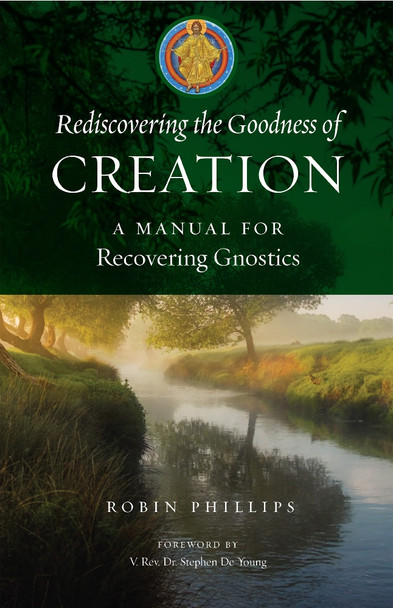In my earlier post, “Against Politics,” I contrasted politics with political theory, arguing that the former activates the amygdala (the primal part of the brain regulating fight-or-flight responses) while the latter activates the frontal cortex, the part of the brain used in higher cognition. Drawing on Aristotle, I argued that political theory is both superior and and prior to political action. Some have interpreted this, as well as other things I’ve written, to mean that I am non-political, or that I believe God’s kingdom is completely separate from this world. But this is a mistake.
When researching for Rediscovering the Goodness of Creation: a Manual for Recovering Gnostics, I spent considerable time studying scripture and the Church Fathers to consider what a Christian political theology might look like. The following section from my book sketches the outlines of a biblical and Orthodox approach to politics. Drawing on saints and Church Fathers throughout history, I argue that Christ’s kingdom is intensely political, but in a way radically different to the political ideologies of this-worldly power. The politics of God’s kingdom is counter-cultural, rooted not in power, aggression, and ideology, but in love, peace, and truth.
Rodrigo recently became uncomfortable when a group at his church got involved in local politics to try to address issues of homelessness and poverty in their community. Although Rodrigo does not have a problem helping homeless people, he has a strong intuition that the church should not be involved in politics. Didn’t Jesus Himself say that His Kingdom is not of this world? “Didn’t Jesus Himself say that His Kingdom is not of this world?” he asks, referring to John 18:36….
.
Here again, we must constantly keep in mind the big picture. Recall from chapter 5 that ancient pagans believed their gods and associated nations were locked in a zero-sum conflict for domination, as each group used violence to prove its god was supreme over the gods of other groups. Because all nations were locked in a never-ending conflict, it followed that justice for one group involved injustice for another group, while a group perceived to be guilty could only expiate that guilt by becoming the target of cathartic rage from a rival. This primitive perspective had no concept of the common good that can unite people across groups, nor did it have a normative framework people could appeal to in order to solve disputes. Thus, politics in the ancient world could never rise above raw power.
.
Christianity largely did away with this pagan perspective, at least in the lands influenced by Christian culture. Pentecost proclaimed the unity of all men and women in Christ and the ongoing work of creation against the forces of chaos and division. Accordingly, the groups that people belonged to no longer primarily defined them; instead, people could define themselves as new creatures in Christ. Moreover, the principalities and powers that war in the heavens suffered catastrophic defeat at the Crucifixion, Resurrection, and Ascension, and no longer have authority over specific nations and geographical areas. This certainly has geopolitical implications, for while Christianity did not abolish conflict between groups, it redefined the terms of engagement. Thus, a recurring theme in political texts throughout the Christian era—which had been completely lacking in the ancient world—shows justice not as a zero-sum contest between warring factions, but instead illustrates a divine justice that brings people of different tribes and nations together to live in harmony with God’s order. Living in harmony with God empowers different peoples to live in harmony with each another and the natural world, at least in principle. Thus, God’s Kingdom is intensely political, for it offers a mandate that promotes flourishing in the entire earth, including the body politic. Crucially, however, the politics of God’s Kingdom do not align with specific parties, candidates, or platforms; rather, God’s Kingdom is countercultural, offering a way of being human that runs contrary to the spirit of this age. God’s Kingdom shows us how to organize human affairs, including civil society, based on the virtues of justice, truth, and love rather than the mere exercise of power.
.
Given the civil implications of the gospel, what then are we to make of Christ’s oft-quoted remark that His Kingdom is not of this world? A more faithful translation of John 18:36 should read, “My Kingdom is not from this world.” N. T. Wright’s Kingdom New Testament renders the passage as follows: “‘My kingdom isn’t the sort that grows in this world,’ replied Jesus. ‘If my kingdom were from this world, my supporters would have fought to stop me being handed over to the Judeans. So, then, my kingdom is not the sort that comes from here.’”
.
In these remarks, which Jesus made during His interview with Pontius Pilate, He offers an important teaching about the origin of His Kingdom. His Kingdom does not arise from the earth as do human empires; rather, it comes to the earth from heaven (the place of God’s presence). While Christ’s Kingdom does not arise from this earth, it is certainly of and for this world.28 “The origins and inner dynamics of the Kingdom of God do not evolve out of the culture and politics of this world,” explains biblical scholar Kenneth Bailey. “But the kingdom is on earth and thereby is deeply concerned for the earth and all that happens to the people who live on it.”
.
Remember that in the Old Testament, the renewed Eden of God’s presence came from outside as the Shekinah glory filled the temple, as a down payment of His intention to sanctify the entire earth. Jesus’ prayer “Your kingdom come. / Your will be done. / On earth as it is in heaven” encapsulated God’s continued intention of sanctifying the entire world from the outside-in. The phrase “kingdom of heaven” in the Gospels has this same meaning, referring to God bringing the rule of heaven (that is, the reign of Israel’s God) to bear in the spacetime world. This divine reign culminates in Revelation 11:15 when “the kingdoms of this world have become the kingdoms of our Lord and of his Christ.” Thus, the prayer “Your kingdom come. / Your will be done. / On earth as it is in heaven,” is not merely aspirational, but prescriptive, for it shows the type of world we must strive to achieve.
.
Before final eschatological fulfillment, all earthly authority is derivative rather than ultimate, an extension of Christ’s own authority over the nations. Accordingly, God requires earthly rulers to use their positions to promote Kingdom values such as justice, order, and peace, instead of chaos, greed, and exploitation. As a renewed image of God, the Church has an important prophetic voice in proclaiming these truths to the world and leading the way in showing what human flourishing looks like for individuals, cities, and nations. Saint Gregory of Nazianzus put this into practice by warning the governor of Nazianzus to desist from the unjust use of political power. As the British Orthodox priest and scholar Fr. Andrew Louth explained, “Beyond the moral and ascetical demands, our life in expectation of the coming of the kingdom has political implications: to promote the values of the kingdom in the societies in which we live ‘between the times,’ or at least to seek to create a society in which the values of the kingdom are comprehensible.”
.
The services of the Orthodox Church embody this same political vision when the reader is instructed to intercede not simply for the Church but also for civil authorities and world rulers. Other prayers specifically ask God to grant us right-believing kings and queens, thus indicating that Christian leaders are a blessing and we should pray to have them.
.
Even so, Rodrigo’s hesitation has some legitimacy. Given our present location in the redemptive-historical flow of history, we retain that element of “not yet.” Prior to the Second Coming, we can only realize the de facto aspects of Christ’s Kingdom in partial and incomplete ways. We are building for a city that is yet to come. Failure to recognize this incompleteness easily leads to the over-realized eschatologies we see in political movements such as Marxism, theonomy, the Social Gospel movement, and certain forms of postmillennialism. Until the Second Coming and the Last Judgment consummate Christ’s Kingdom, this earth will continue to be a battleground between the forces of Eden versus wilderness, truth versus falsehood, justice versus injustice, the culture of life versus the culture of death. Christians can and should join this cosmic battle through the work we do in our families, churches, communities, cities, and nations, but we cannot measure our progress in purely earthly terms.
.
For most of us, the role we will play in God’s project of making all things new will simply involve helping a small circle of family members and friends, while trusting God to take care of the salvation of the whole world. Here we can take comfort from the words of Elder Epiphanios of Athens (1930–1982): after reminding people that “God appointed the salvation of the world to His Son and not to us,” he said, “we must first look at our soul, and, if we can, let’s help five or six people around us.”
.
We should also keep in mind that often the men and women who play the most important role in this spiritual battle are men like St. Anthony the Great who withdrew from society to work behind the scenes in prayer, asceticism, and spiritual warfare. This type of strategic withdrawal from the world and culture is ultimately grounded in the goodness of creation and our love for the world. As St. Paisios (1924–1994) put it, “The monk flees far from the world, not because he detests the world, but because he loves the world and in this way he is better able to help the world through his prayer, in things that don’t happen humanly but only through divine intervention. In this way God saves the world.”
Further Reading



